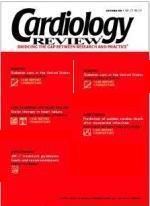The importance of the metabolic syndrome as a risk factor for CV disease
This month Cardiology Review opens with a continuing medical education feature in the hypertension section by Dr. Thomas Zeller and associates from Germany. They studied 215 consecutive patients with ostial renal artery stenosis, a cause of poorly controlled hypertension. These patients were treated with percutaneous stenting of the lesions with encouraging results, as Dr. Naveed N. Masani and colleagues emphasize in their commentary.
Our second continuing medical education feature is a combined lipid and arrhythmia section report on yet another use for those wonder drugs, the statins. Can statins really protect against atrial fibrillation, as Drs. Yinong Young-Xu and Shmuel Ravid suggest in their study of 449 patients? Is the mechanism related to reduced serum cholesterol levels or an anti-inflammatory effect? Dr. Ernst A. Raeder ponders both of these questions in his commentary.
In a combined article in the diabetes and stroke sections, Drs. John K. Ninomiya and Michael H. Criqui report on their study of the relationship between the metabolic syndrome (a major component of which is insulin resistance) and certain cardiovascular events, including stroke. Using a large database of 15,922 subjects (from the National Health and Nutrition Examination Survey [NHANES] III), the authors found that the prevalence of stroke was 2.9% and myocardial infarction and/or stroke 5.2% when weighted to the general US population. Their study confirms the clinical importance of the metabolic syndrome as a significant risk factor for cardiovascular disease, a conclusion with which our commentator, Dr. RoseMarie Pasmantier, concurs. She also emphasizes the need for developing strategies to educate physicians about controlling this syndrome.
In the CAD/angina section, Dr. Giora Landesberg and colleagues from Israel studied 447 consecutive vascular surgery patients and found between 14 and 107 had some degree of perioperative myocardial damage. Cardiology Review asked its vascular surgery consultant, Dr. Louis Kozloff, to comment on this study, and he adds some useful caveats in his remarks.
In our final article this month in the heart failure section, Drs. W.H. Wilson Tang and Gary S. Francis conducted a retrospective evaluation of 662 consecutive heart failure patients in order to determine how many had nondiagnostic (low) B-natriuretic peptide levels. Their provocative findings are commented on by Dr. Michael W. Rich.
